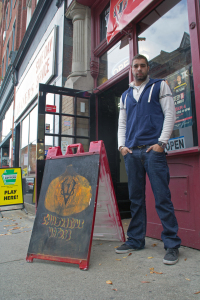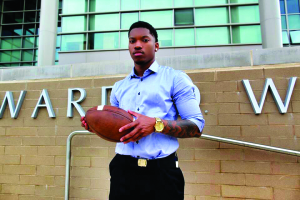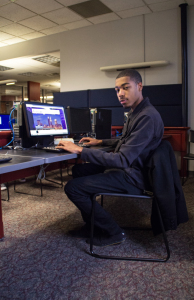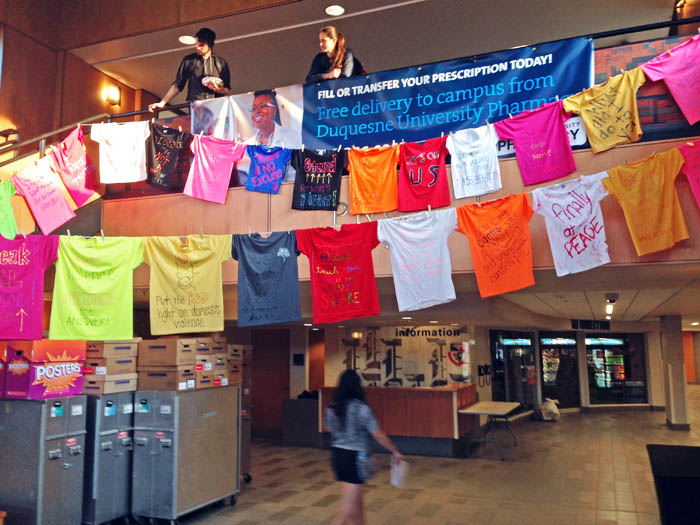

By: Zach Brendza | Features Editor
As a high school senior, Spencer Rubeck had to complete a service project to become an Eagle Scout. Nothing out of the usual, he just distributed oil catching bilge socks with the Coast Guard to all the Great Lakes. In a week, the socks had eliminated 2,500 to 3,000 square miles of surface oil.
“When you do something like that, that was hard at the time, it makes everything easier. Once you do something once you can do it again,” Rubeck said.
As a Duquesne senior, he is the youngest business owner in South Side, according to the South Side Chamber of Commerce. He opened Innovative Vapors, a new e-cigarette shop, in June, with a second location on the North Shore coming in November.
Rubeck encountered e-cigarettes in his hometown of Hamburg, New York, a suburb of Buffalo. His stepdad smoked two packs of Marlboro 100’s a day. As a Christmas present, Rubeck bought his stepdad an e-cig three years ago and he hasn’t smoked filtered cigarettes since. Then the market exploded. Within a year, the number of stores in his area increased from two to 65.
With the growth of the market in Buffalo, Rubeck saw the opportunity for a shop in Pittsburgh. He wrote a business plan for a store and took it to investors. The first three times he was denied, but “If you do it enough times, you’ll get the right answer,” Rubeck said, and he did with his fourth attempt.
After securing investors, he needed a location. Spending $2000, money he had saved through high school and college, Rubeck bought products for the store. He went up and down East Carson Street, going from business to business asking if he could sell his products in their stores, rent out a glass case, anything to get the ball rolling. But no one would bite.
He caught a break when he saw the space at 1206 East Carson St. go on the market. He talked to his investors and pulled the trigger on the location, less than a mile from campus.
“I was kicking my feet in the dirt and a week later we had a store,” Rubeck said. “It happened so fast.”
Now Rubeck is in the store 65 hours a week, juggling the day to day tasks of a business owner and student. Staffing his store with Duquesne students, Innovative Vapors specializes in selling their own e-juice, a painstaking process that took him, fourth year pharmacy major Josh Porta and others months to figure out.
The e-juice, made in house, has led to the business “going green” in under three months, allowing Rubeck to pay back his investors. It usually takes a business three to four years to turn a profit but the e-cigarette industry is such a gold mine that it took a fraction of that time, Rubeck said.
While all-nighters and missed classes are frequent in the senior marketing major’s life, he’s not going to quit school or the store.
“Its nuts, dude. I didn’t sleep last night because I had two tests this morning,” Rubeck said. “I do miss a lot of class, though. I’m doing the best I can. I’m not going to not pass. I’ve come this far.”
By: Saúl Berríos-Thomas | Layout Editor

Drugs, gang violence and illegal activity were commonplace on the cold hard streets of Washington, D.C., but Don Hursey III found a way out of all that.
Hursey made his way out of the chaos of his childhood and is already a successful businessman before he graduates college. The journey for him was not easy, but it made him who he is today.
Hursey recognizes what his upbringing did for him.
“It humbled me a lot. I was wild growing up and I lost a lot of people,” he said. “I decided to take a different path by playing football.”
Even football was a tough experience for Hursey. After several failed attempts at finding a good fit he enrolled at Lackawanna College. Hursey was having “the best season of my life,” until he tore his ACL. Many schools pulled their offer, but one didn’t: Duquesne.
His ACL didn’t heal the way he wanted it to so he knew he needed to do something else since a career in the NFL wasn’t looking very likely. He needed a way to support himself and his family.
“People look to me to take care of the family because I was the oldest cousin and I was the football star,” Hursey said.
He started by venturing into real estate. He started Hursey Properties on his own in Pittsburgh in October of 2012. He was on crutches when he sold his first house.
“After people saw how serious I was I got more help,” he said. “Then it became second nature. We sold 10 houses in the first year.”
He didn’t love real estate, though, and he knew it wasn’t what he wanted long term. So he focused on technology.
His first venture was Srvd. The app allows people to order drinks from their phone instead of standing at a crowded bar trying to get the bartender’s attention. He joined the team after the app had been created and was responsible for marketing it. At Startup Weekend Pittsburgh, Hursey was responsible for pitching the app to both judges and potential investors, which ultimately got the app second place in the contest for best startup.
“We had 12 bars sign up in a matter of days,” Hursey said.
This was when Hursey realized he could do this for a living and focus on the things he knew best: entertainment and sports.
He stepped away from Srvd to work on his own creation known as Plugd. Tinder, allows people to put in their information and matches them up based on mutual connections to go out on dates. Hursey’s Plugd app does the same thing for up-and-coming musicians. It links them to venues who are looking to schedule performances. The musicians’ YouTube videos and SoundCloud sites can be found directly in the app, which makes the vetting process easier for the venues. The app is not yet live because Hursey and his team are in the process of finishing it up, but the website and app “should be live in a month.”
Hursey is focused on DSD Empire, his other major project, as well. He along Washington NFL team member and friend, David Amerson, and his cousin, Colorado University defensive back Sherrard Harrington, founded the company.
Hursey described the company.
“It is an entertainer and sports marketing and branding business,” he said.
These ventures have all began before he even graduated college. He believes he has just scratched the surface of his business abilities. Some may doubt Hursey. However, the bullets, gangs and poverty couldn’t stop Hursey from escaping the streets of Washington D.C., so what could stop him from achieving success in the business world?
Ask Don Hursey:
“I am determined, resilient and persistent. I don’t know what the word ‘no’ means.”

By: Seth Culp-Ressler |Asst. Features Editor
Solomon Ilochi, founder and CEO of Heardle, is trying to help lesser-known music artists gain exposure, all while attempting to do the same for himself.
Currently a junior computer science major, Ilochi created his startup Heardle to curate and aggregate local artists’ work from around the web onto one easy platform.
“Currently we’re just doing that through the website,” Ilochi said, “But by the end of the year we should have our Internet radio station up on TuneIn and on our website too.”
He first started working on the project in August 2012, and initially the name for the company was Pittsburgh Beats, Ilochi said. Many of his friends and relatives are musicians, and as multiple requests started rolling in for personal websites he decided to tackle them all by creating one aggregation platform for Pittsburgh. Over the past three years, the company has evolved into a less area-specific platform.
“[Pittsburgh Beats] has kind of transformed into Heardle, which is just all genres, all types of music, all across the country, as opposed to just Pittsburgh. Local, but everywhere at the same time,” he explained.
Ilochi said that his time at Duquesne has mainly helped with “self-discovery.” He pointed out that without the courses he has taken and people-skills he has learned, the website would not be nearly as developed as it currently is. In simple terms, Ilochi said that Duquesne helped him learn how to “work in the real world.”
Ideally, he would love to see Heardle become a household name. Ultimately though, what he really wants is to make a difference for the artists he serves.
“More than anything [I want to] actually be able to help local, lesser-known artists because that is the main goal,” he said. “And hopefully as a result of that we can be acquired by some larger music corporation like SoundCloud. For right now though I’m just kind of cruising and doing what I need to do to get it to continue to work.”
Ilochi’s biggest advice for anybody thinking about pursuing the entrepreneurial dream? Believe in yourself, and make sure that you are your own biggest fan.
“People are going to say that this is stupid. People are going to tell you ‘don’t do it,’” Ilochi said. “Just do what’s going to make you happy, because in the end it’s just going to be you and the IRS.”




